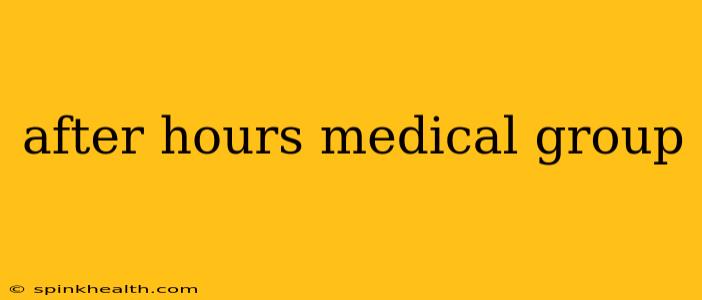The clock strikes midnight, and a sharp pain shoots through your side. Or maybe it's 3 am, and your child wakes with a high fever. These are the moments when the comforting predictability of regular doctor's hours disappears, leaving you scrambling for after-hours medical care. Finding the right solution can be stressful, but understanding your options can ease the anxiety and ensure you receive the timely care you need. This guide will walk you through navigating the world of after-hours medical groups and finding the perfect fit for your situation.
What is an After-Hours Medical Group?
An after-hours medical group, simply put, is a healthcare provider or group of providers offering medical services outside of typical business hours. These services can range from urgent care for non-life-threatening conditions to telehealth consultations for less pressing issues. They often fill the gap between your regular doctor's office and the emergency room, providing a crucial link in the healthcare chain. These groups often employ doctors, nurse practitioners, and physician assistants with expertise in handling a variety of urgent medical needs.
What Types of After-Hours Medical Services are Available?
Many factors influence the specific services offered by an after-hours medical group. However, common services include:
- Urgent Care: This is the most common service offered, treating conditions like sprains, minor cuts, infections, and flu-like symptoms.
- Telehealth: Increasingly popular, telehealth offers virtual consultations for less severe conditions, often saving you a trip to the clinic.
- Walk-in Clinics: Many after-hours groups operate walk-in clinics, allowing you to receive care without an appointment.
- Minor Surgery: Some groups may offer minor surgical procedures, depending on their capabilities and staffing.
The availability of specific services will vary significantly based on the size and specialization of the group and local regulations.
What are the Benefits of Using an After-Hours Medical Group?
Choosing an after-hours medical group offers several advantages:
- Convenience: Access to care when your regular doctor's office is closed.
- Shorter Wait Times (Often): Compared to emergency rooms, after-hours clinics often have shorter wait times.
- Lower Costs: Generally less expensive than a visit to the emergency room.
- Specialized Care: Some groups specialize in specific areas, such as pediatrics or orthopedics.
How to Find the Right After-Hours Medical Group for You?
Finding the right fit involves several steps:
- Check Your Insurance: Verify which after-hours medical groups are covered by your health insurance plan.
- Online Search: Use online search engines, including Google Maps, to find after-hours clinics in your area. Look for reviews and ratings.
- Ask for Recommendations: Friends, family, and your regular doctor can provide valuable recommendations.
- Consider Location and Accessibility: Choose a location that is easily accessible, especially if you're dealing with an urgent situation.
What are the Differences Between After-Hours Clinics and Emergency Rooms?
This is a crucial distinction. After-hours clinics handle non-life-threatening conditions, while emergency rooms address life-threatening emergencies. Going to the ER for a minor ailment unnecessarily burdens the system and can lead to longer wait times for those genuinely needing critical care.
What are the Costs Associated with After-Hours Medical Care?
Costs vary greatly depending on the services received, the specific clinic, and your insurance coverage. It's always best to clarify pricing before your visit.
Can I Use an After-Hours Medical Group for Ongoing Healthcare?
No, after-hours medical groups are designed for urgent and non-life-threatening conditions. For ongoing healthcare needs, you should continue to see your regular primary care physician.
Navigating after-hours medical care doesn't have to be daunting. By understanding your options and taking the time to find a suitable group, you can ensure you receive timely, appropriate, and convenient care whenever you need it. Remember, prioritizing your health is key, and having a plan for after-hours medical needs offers peace of mind.

